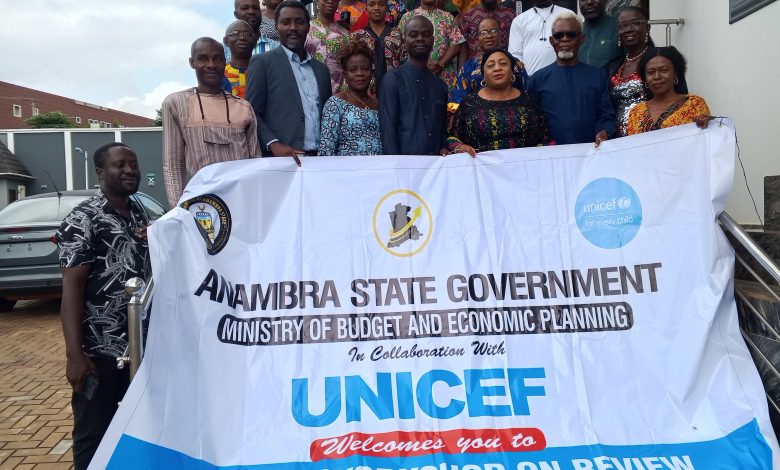UNICEF trains Anambra budget planners on resource allocation to enhance children’s development
News

By Our Corespondent
The United Nations Children’s Fund, UNICEF, has mounted a three- day training for heads of planning in key Ministries, Departments and Agencies, MDAs, in Anambra State on ways to enhance resource allocation in areas concerning children’s welfare and development.
No fewer than 36 persons from the Ministries of Budget and Economic Planning, Youth Development, Women Affairs, Finance, Health, Agriculture, Education, Local Government, among others, are participating in the workshop.
A UNICEF Consultant, Dr Sola Omoju, said during the opening ceremony in Awka, that as a very important development partner to Nigeria at both the state and federal levels, the world body has been working within the context of the United Nations to provide support on issues concerning children.
“In Nigeria, we are intervening in the areas of education, health, nutrition, sanitation and hygiene, as well as in child social protection. The reason is that UNICEF wants the children to develop in a good environment.
“UNICEF is supporting the empowerment of those planning budgets that touch the children to link up with how they are spending money on the key areas in the state’s annual expenditures”, Omoju said.
He observed that over the years, UNICEF has been looking at resource allocations in the educational, health, and other areas that impact on children, adding that it was found out that they are not commensurate with the expectations.
He explained that it was for that reason that informed the decision by UNICEF to provide technical support to selected states in the country.
“UNICEF is so passionate about the children, hence the need to provide the support, so that in the next three years, for instance, the affected states should be linking their resources to the UNICEF focus areas that are of particular interest to the children.
“One of the things we want to do is to build capacity of the civil servants involved in planning and budget, so that they will see the need to allocate adequate resources to the relevant areas.
“UNICEF is not trying to force figures on the states, but to build the capacity of the civil servants as we believe that in few years to come, the impact of this capacity building will be felt in Anambra State to the benefit of their MDAs”, he added.
Welcoming the participants, the Principal Planning Officer in the state Ministry of Budget and Economic Planning, Dr. Chinedu Nwankwo said the workshop would center on a review and update of the state’s crucial policy documents, namely: the Medium-Term Expenditure Framework and the Medium-Term Sector Strategy.
He described the Medium-Term Expenditure Framework (MTEF), as a key policy document embedded in the state’s budget process, adding that it is instrumental in charting the way forward for Anambra State.
“The framework reviews and highlights the government expenditure plan over the next three years”, he said, while the Medium Term Sector Strategy (MTSS) is one of the crucial components of the MTEF framework, which outlines the goals, objectives, and strategies of a specific sector over a given period.
Nwankwo added: “It is a critical initiative that helps to improve overall sector performance, address sector challenges, and promote sustainable development.
“The workshop brings together stakeholders from various sectors, and their collective expertise, insights, and perspectives will be valuable in shaping a sector that will be more effective.”
He commended UNICEF for the continued support to the state, assuring that the collaborative effort would effectively develop a comprehensive strategy that will guide sectoral growth and development.
The UNICEF focal person in the Ministry of Budget and Economic Planning, Orji Obiananma said the objective of the workshop is to align plans with the current state priorities, including enhancing resources allocation and accountability, as well as strengthening budget planning.




